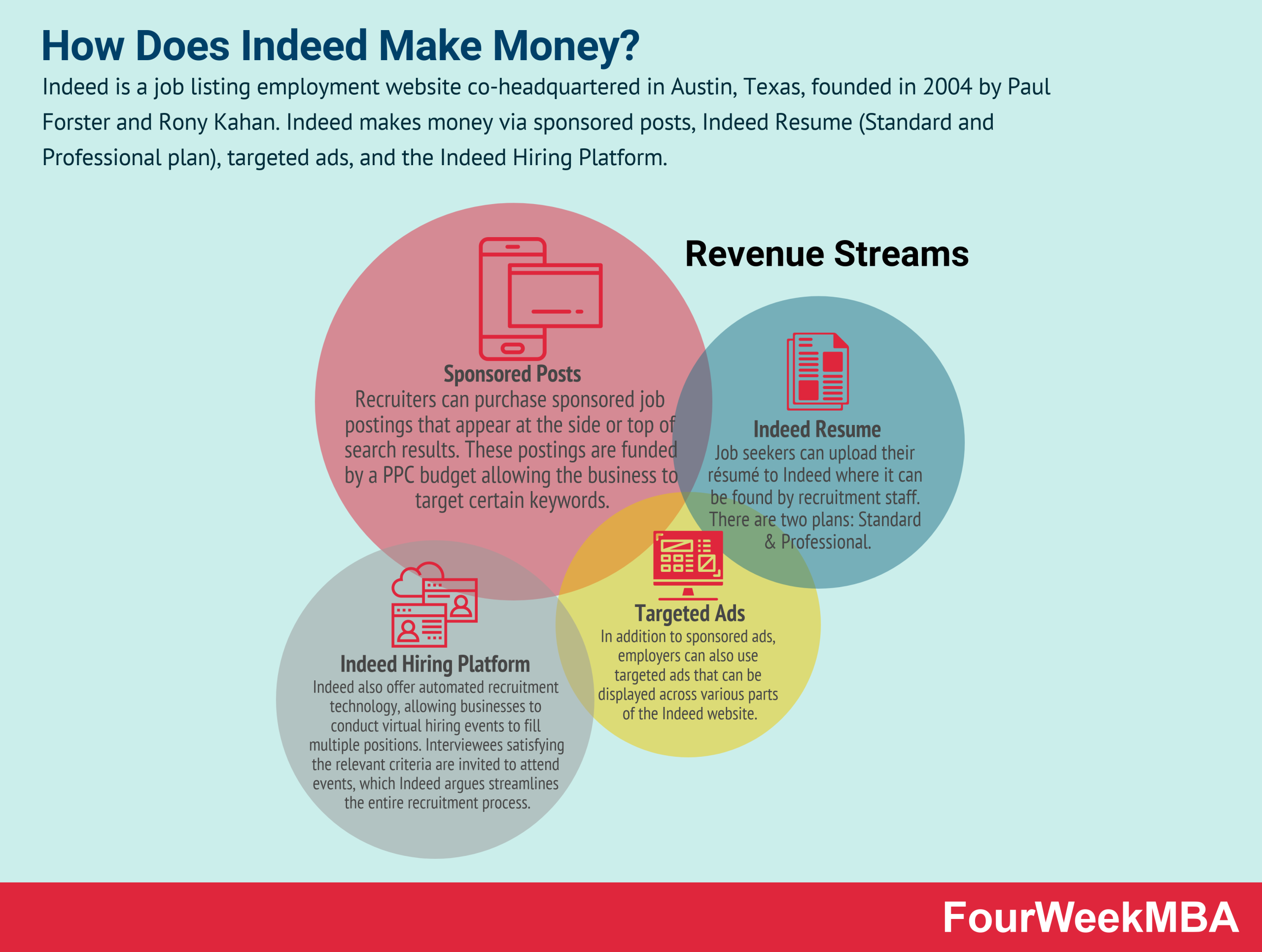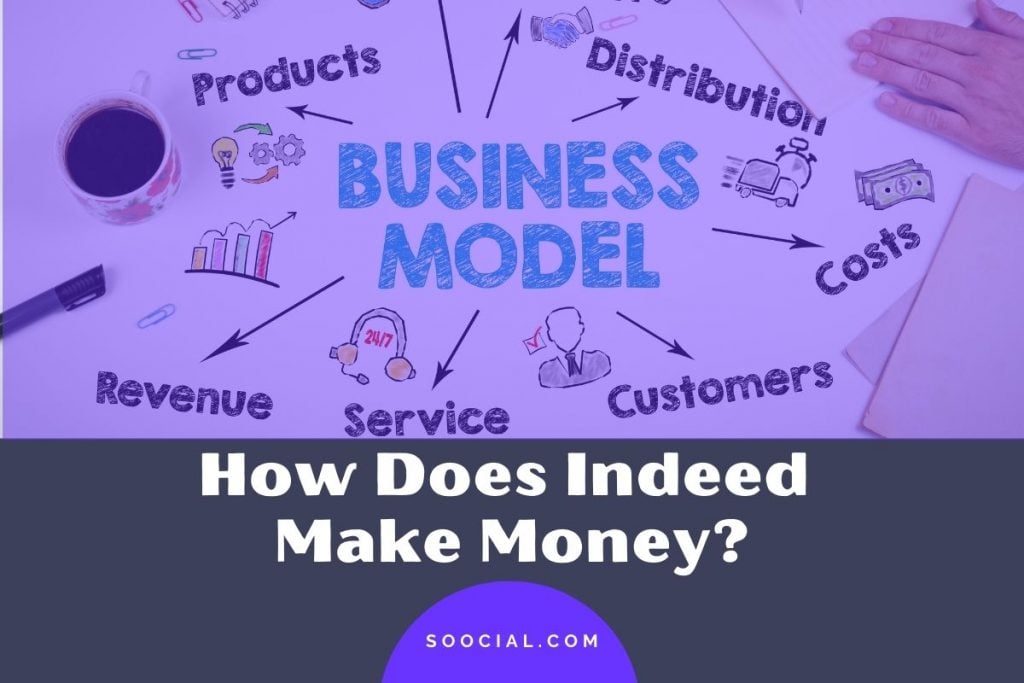How Does Indeed Make Money? Unpacking The Job Site's Business Model
Have you ever wondered how Indeed, a platform that helps millions find work, actually keeps its lights on? It's a very common question, you know. For many people, Indeed is simply a free place to look for a new job, which is great. But, like any big service, it has to have a way to make money to keep going, and that's what we're going to explore today, as a matter of fact.
Indeed launched in 2004, and since then, it has become a really big name in the job search world. It connects job seekers with employers every single day, so it's a huge hub. With over 250 million unique visitors each month from more than 190 countries, it's pretty much the world's largest job site, and that's a lot of people.
The company's whole way of doing business, its business model, really centers around helping employers find the right people. This means Indeed gets its income by offering services and features that employers are willing to pay for. So, how does Indeed make money? We'll get into the details, you know, and see just how this massive platform generates its income.
- Jackermans Mothers Warmth Chapter 3 A Deep Dive.linkmaz
- Is David Muir Lgbtq.linkmaz
- Hdhub4u Your Ultimate Guide To Bollywood Hindi Movies Latest Releases Classics.linkmaz
- Drew Pritchard New Wife.linkmaz
- Names Of Paw Patrol Characters.linkmaz
Table of Contents
- Understanding Indeed's Core Purpose
- The Main Ways Indeed Makes Money
- Why Indeed's Model Works
- Frequently Asked Questions About Indeed's Finances
- The Future of Indeed's Revenue
Understanding Indeed's Core Purpose
Indeed, as a company, has a really clear goal: to connect people looking for jobs with companies that need to hire. It's an online recruitment and job-finding marketplace, launched way back in 2004, and it has grown in popularity big times, you know, since it first started. This core purpose, actually, is what drives its entire business.
The platform is set up to be very user-friendly for job seekers. They can search for jobs, upload their resumes, and apply for positions all without paying anything. This free access, you see, draws in a huge number of job seekers, which is vital. It creates a massive pool of talent, which is exactly what employers are looking for, and that's key.
For employers, Indeed offers a way to reach a very wide audience of potential candidates. This connection, between job seekers and employers, is what Indeed is all about. It's how they make themselves so valuable, really. They act as the middle ground, making the whole hiring process a little bit easier for everyone involved, and that's their primary function.
- Exploring Roblox R34 Understanding The Controversial Side Of The Gaming Community.linkmaz
- Valvoline Oil Change Coupon 25 Off 50 Off Your Ultimate Guide To Savings.linkmaz
- Basel1.linkmaz
- Xxxxxx Is Equal To 2 X A Simple Guide To Decoding This Equation.linkmaz
- Elani Nassif A Rising Star In The World Of Entertainment.linkmaz
The Main Ways Indeed Makes Money
So, if job seekers use it for free, how does Indeed make money? Well, the business model, in a way, focuses on what employers need. Indeed charges for extra features and for promoting job posts. This allows companies to get their job openings seen by more people or to find specific candidates faster, you know.
Many career websites, including Indeed, make a good profit through various methods. Indeed's approach revolves around its role as a leading job search engine. It effectively brings together job seekers and employers. Let's look at the main income streams, actually, that help Indeed stay afloat and grow.
Sponsored Job Posts and Advertising
One of the biggest ways Indeed earns money is through sponsored job posts. When an employer posts a job, they can choose to "sponsor" it. This means they pay Indeed to make their job listing more visible, you see. It will appear higher in search results, often above regular, free listings.
This works on a pay-per-click model, kind of. Employers pay when someone clicks on their sponsored job post. This helps them reach the right candidates faster, which is pretty important for hiring. It's a way for companies to stand out in a crowded job market, and that's a big draw for them.
Employers pay to post their jobs on Indeed to get better visibility. This ensures their openings are seen by more relevant job seekers. It's a direct way Indeed converts its massive user base into revenue, obviously. The more clicks a sponsored job gets, the more the employer pays, up to their set budget, you know.
This advertising model is quite common for online platforms. It gives employers control over their spending and how much exposure their jobs receive. It’s a very effective system for both Indeed and the companies using its services, so it works out well. Indeed provides the audience, and employers pay for priority access to that audience, essentially.
Accessing the Resume Database
Another important revenue stream for Indeed comes from providing access to its vast resume database. Think about it: millions of job seekers upload their resumes to Indeed, and that's a lot of information. This creates a huge pool of potential candidates for employers, which is incredibly valuable, in a way.
Employers can pay for subscriptions or credits to search this database. This allows them to proactively find candidates who might be a good fit for their open positions, even if those candidates haven't applied directly. It's like a reverse job search, where the employer finds the person, you know.
This service is especially helpful for hard-to-fill roles or for companies looking for very specific skills. Instead of waiting for applications, they can actively look for people with the right experience. It saves them time and effort, which is why they are willing to pay for it, apparently.
The resume database access helps Indeed make money by offering a premium service to employers. It adds a lot of value to the platform beyond just job postings. It shows how Indeed's business model is centered around providing comprehensive hiring solutions, and that's a strong point for them.
Employer Branding and Sponsorships
Beyond just posting jobs and searching resumes, Indeed also earns money through various sponsorships and additional features aimed at employer branding. Companies want to look good to potential employees, you know, and Indeed helps them do that. This means creating a positive image and attracting top talent.
For example, employers can create company pages on Indeed, which are like mini-websites showcasing their culture, benefits, and employee reviews. These pages can be enhanced with paid features to make them more prominent and appealing. It's a way for companies to tell their story, more or less.
These branding opportunities help employers build a strong presence on the platform. It can make them more attractive to job seekers, which in turn helps them hire better people. Indeed offers different packages for these services, allowing companies to choose what fits their needs and budget, actually.
These sponsorships and branding tools are part of Indeed's broader strategy to support employers throughout the entire hiring process. It's not just about listing jobs; it's about helping companies present themselves well and find the best fit. This diversified approach helps Indeed maintain its revenue streams, and that's pretty smart.
Why Indeed's Model Works
Indeed's business model works because it creates a valuable cycle. Job seekers use the platform because it's free and has a lot of jobs. This large user base attracts employers, who pay to reach these job seekers. The more job seekers there are, the more valuable Indeed becomes to employers, so it's a good loop.
This kind of network effect is really powerful. Indeed has become the go-to place for many people looking for work, which means it's also the go-to place for many companies looking to hire. It's a very efficient marketplace, basically, where supply and demand meet in a very big way.
The company's ability to connect millions of job seekers with employers every day is its main asset. By charging for premium services that enhance this connection for employers, Indeed has built a sustainable and profitable business. It's a clear example of how a free service for one group can be funded by another group, you know, who gains significant value.
Indeed's success shows that providing a useful, free service to a large audience can be a very effective way to make money. They've perfected the art of connecting people, and then offering paid tools to make those connections even better for the paying customers. Learn more about online business models on our site, for instance, to see other examples of this approach.
Frequently Asked Questions About Indeed's Finances
People often have questions about how a free service like Indeed generates its income. Here are a few common ones, you know, that might help clear things up.
Is Indeed really free for job seekers?
Yes, Indeed is absolutely free for job seekers. You can search for jobs, create a resume, and apply to positions without paying anything. The company's revenue comes from employers who pay for things like sponsored job posts and access to the resume database, you see.
Do employers have to pay to post jobs on Indeed?
No, employers can post jobs for free on Indeed, too. However, if they want their job posts to get more visibility, appear higher in search results, or reach a specific type of candidate faster, they usually opt for sponsored posts or other paid features. These paid options are how Indeed makes money from employers, actually.
Does Indeed sell user data?
Indeed makes money through services like sponsored job posts, resume database access for employers, and employer branding solutions. While the provided text mentions that "many career websites including indeed make a huge profit through various means, such as selling of customers databases, email," Indeed's primary stated revenue streams focus on direct services to employers. Access to the resume database allows employers to search for candidates, but this is a controlled service, not typically a direct "sale" of individual user data in the way some might think, you know.
The Future of Indeed's Revenue
As the job market changes, Indeed will likely keep adapting its ways of making money. The company has always focused on connecting people with jobs, and that's a constant need. They might introduce new tools for employers, perhaps related to hiring analytics or even more specialized recruitment services, you know, in the future.
The online recruitment space is always evolving. Indeed's ability to stay at the top shows it's very good at understanding what both job seekers and employers need. Their revenue streams, built around paid services for employers, seem quite stable for now, actually. It's a model that has served them well for many years.
Indeed continues to be a very important player in the global job market. Its consistent growth since 2004, and its massive user base, suggest its business model is robust. The company will likely keep innovating to ensure it remains the leading job site, and that's a big goal. For more insights on how large online platforms operate, you might like your other articles on business models.
- Vegamoviesrs Your Ultimate Destination For Entertainment And Movie Streaming.linkmaz
- Cinasworldx Leaks Unveiling The Truth Behind The Controversy.linkmaz
- Camilla Araujo Onlyfans Leaks What You Need To Know Where To Find.linkmaz
- Jackerman.linkmaz
- Dawn Hopkins Indiana Prison A Deep Dive Into Her Story And Impact.linkmaz

How Does Indeed Make Money? The Indeed Business Model In A Nutshell - FourWeekMBA

How Does Indeed Make Money? Indeed Business Model - Soocial
![How Does Indeed Make Money? [Business Model] - MoneyModels](https://moneymodels.org/wp-content/uploads/2020/10/How-does-Indeed-make-money.jpg)
How Does Indeed Make Money? [Business Model] - MoneyModels